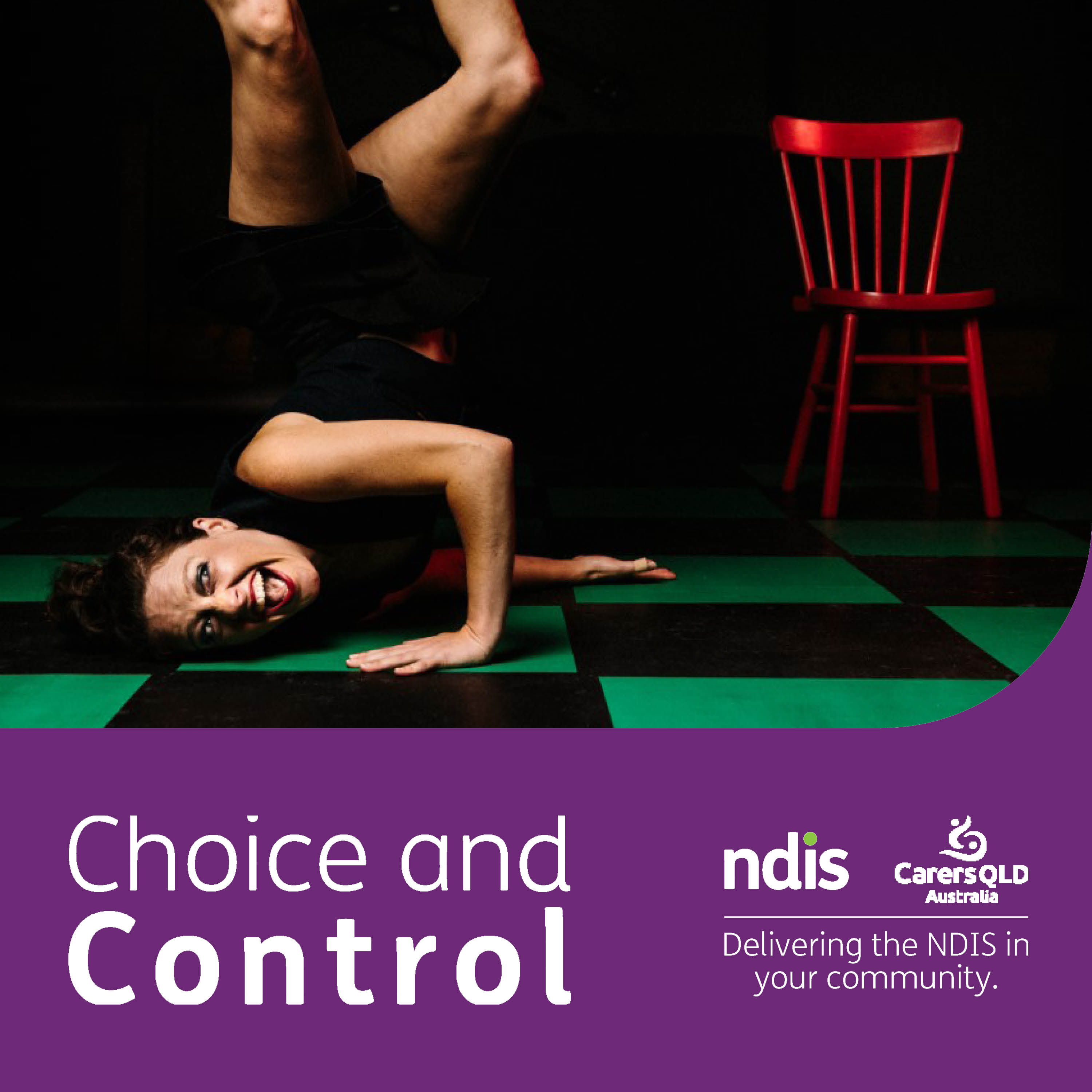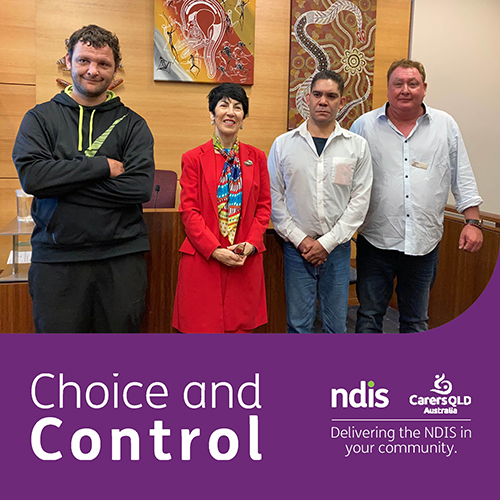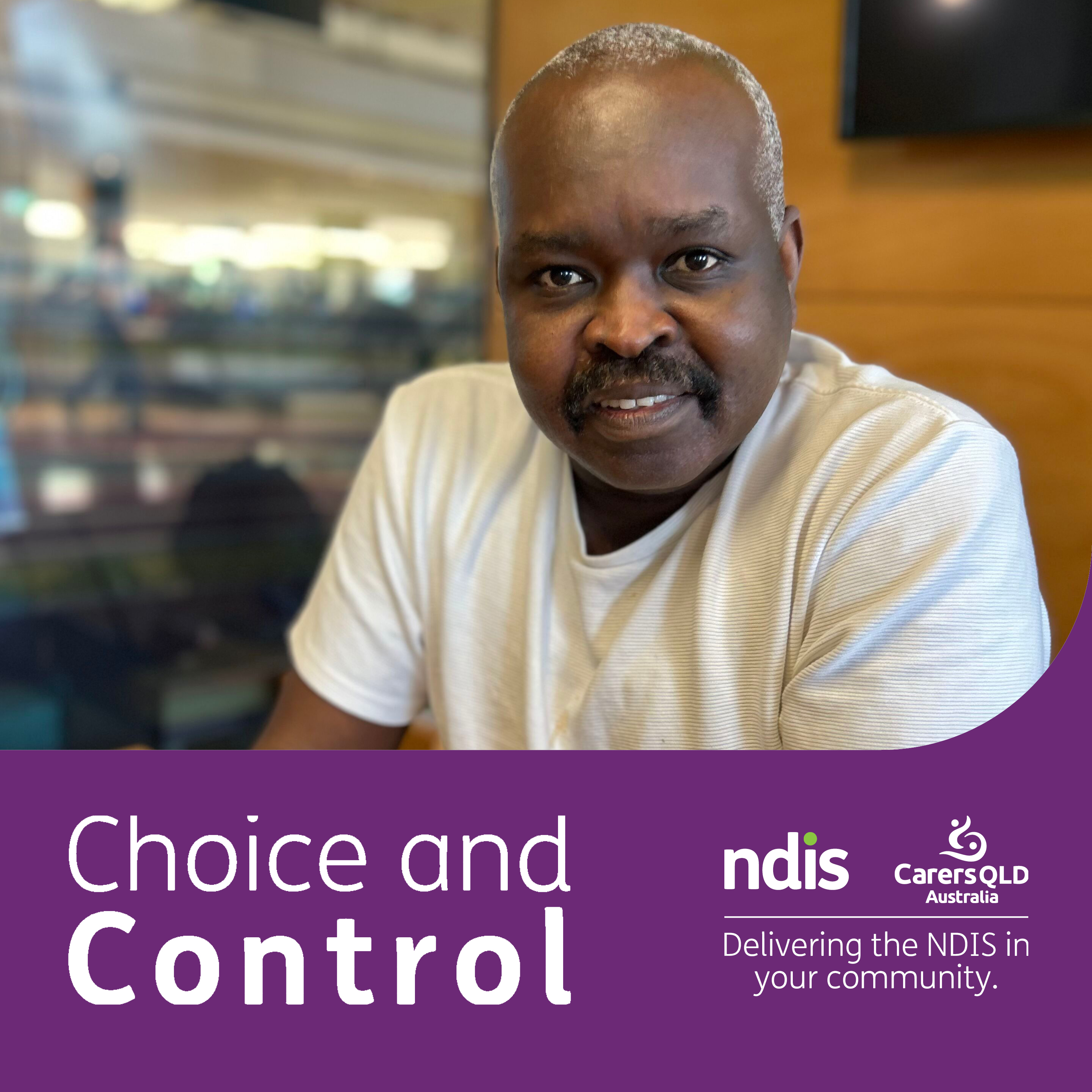Speaker 0 00:00:00 Getting started with your first national disability insurance scheme plan. Get off to a strong start with carers Queensland's free workshop using your Endis plans. Learn how to use your funding. Work with service providers and use the my place portal. Find out more. Check for events coming up near year and book your spot
[email protected]. You can also call us on 1300 triple 9, 6 3 6
Speaker 0 00:00:35 Joyce and control a podcast. Celebrating people with disability brought to you by carers Queensland, indice, local area coordination partner in the community. Ever wondered how the Paralympic classification system works. For instance, swimmer scooter Patterson competes in the S3 competition. The S stands for swimming specifically freestyle by the fly and backstroke. Breaststroke is SB. The medley is SM. Then there's T for track F field, you get the idea, the number reflects the nature of the athlete's disability and how it affects their performance in their chosen sport. It's a way of making sure athletes are competing against others with similar challenges. So the final result doesn't come down to their disability, but their skill, their training, their strategy, the things professional athletes spend years refining, generally the lower, the number, the more severe the disability, going back to scooter Pederson as three athletes have physical disability effecting all four limbs. That could mean things like quadriplegia, quadriplegic, cerebral palsy, or multiple limb difference, but there are often fewer athletes in those classifications with the smaller numbers. And that means there might not be enough people from enough different countries to make the hair competition viable head coach of the Australian Paralympic swimming team. Brendan Berchard explains,
Speaker 2 00:02:01 Um, category is subject to, um, lack of viability like, cause it's a competition that needs to be a number of competitors and they've they make additional allowances in those more severe classes, which is good because it's, it's definitely hard. I, you know, if you, you have a severe in payments to a, just to get down and do some form of exercise, little land, um, try and compete. So, you know, I mean the differences are, you know, higher class, like a less impairment profile. Um, the rule to make it a fake competition is there's gotta be at least six swimmers and, and no more than two from each country. So if you then have enough of those competitors, that event, doesn't go ahead for the lower classes. They've broadened that out to, it can be five summers, then it can be three from a country. If he's still trying to, you know, facilitating and supporting and making allowances for those lower classes, I say louder in terms of the number, you know, I said that they can can pay, but it's going to get that balance between it's gotta be it's competition. So that needs to be a viable competition, but also encourage and support areas that that do
Speaker 0 00:03:11 Dr. Ian dutier is a physiotherapist I researcher with the university of Queensland and a para sport classifier. He says it's a very complex system. It varies from sport to sport, and it's constantly evolving.
Speaker 3 00:03:24 The classification system in Paralympic sport is quite complex and it's still evolving over time. So there's still a lot of research around the world going into developing evidence-based classification systems and each sport has its own classification system. And within those, those systems, the aim is to try and minimize the effect of impairment on performance. So the, the athlete who wins, shouldn't be the one with disability that causes the least amount of difficulty in the sport. It should be the best athlete. And so in classification, we have athletes with more complex and severe disabilities whose whose impairments cause a lot of difficulty in that sport. And we've also got at the other end of the spectrum athletes with disabilities that cause relatively minor difficulties in their sports. So yeah, what we're seeing in some sports is perhaps a declining number of athletes with more complex disability at the elite level at the Paralympic games.
Speaker 3 00:04:27 But it does tie into participation because to have events at the, at the elite level, you need the athletes. You know, I guess from the IPC's perspective, we need to have competitive events at the elite level and you need lots of athletes at the grassroots level competing around the world to, to develop that level of competition. So, uh, really to, to fill up those events for more people with more complex disability, we have to start with participation around the world. And of course, people with more complex disability, they face created barriers to participation than those with less severe impairments. So they need, you know, fundamental assistance with activities of daily living. So things like getting dressed, getting to training or, uh, out in the environment, transport getting changed, getting into facilities, they need assistance with their training. They need expertise to help manage their disability during sport and, and all the challenges that come with kind of intensive training. So, uh, that's, that's difficult and it's expensive and we don't have a huge amount of research to evaluate what the effect of that is and how to best help manage athletes with complex disability who have high support needs. So yeah, in a nutshell, we've got quite a bit of work to do, to develop sport for athletes, athletes with high support needs are out in the world.
Speaker 0 00:05:55 Absolutely because I understand at the
Speaker 4 00:05:57 Olympic games and I'll actually go to have as many categories for those with most severe disabilities.
Speaker 3 00:06:02 Is that right? In some sports, in some events yep. And swimming there's for people with physical disabilities, there's 10 classes, um, one to 10. So classes one to three, or for those, with the most complex disabilities for athletes with high support needs. And at 2024, it looks like there's not going to be any events for us ones. Um, with the most severe impairments and only a few for us twos and they'll all be for male athletes. So, uh, yeah, there's a, there's a gender issue here as well with participation for females in sport who have high support needs. And yeah, like I say, that, that the reason that's happened is because of an event viability rule. So to be included in the games, uh, events have to meet certain viability criteria that are set by the international Paralympic committee. A couple of those, those events in the law classes for athletes with high support needs has been, they don't meet that criteria.
Speaker 3 00:06:59 So they've been removed from the program for Paris 20, 24, but do you see how that doesn't help, you know, you have low participation, so they don't meet the criteria. So if you remove the, the event from the games, then you're actually compounding the issue, right? So, um, because that, that kind of competition helps to drive participation without the event that the games, you really not going to get athletes, uh, into the, into those classes and participating around the world because the games really dictates how funding is sent through sporting systems and how, how countries prioritize, where they invest. And so nations aren't going to invest in athletes with high support needs without the events of the games. The problem is you can't apply the same rules to all, all people with disabilities when it comes to inclusion, because inclusion is hard for some more than others.
Speaker 3 00:07:54 Um, it's an issue of equity, which is, which is hard to achieve even for these, you know, international, global sporting organizations who have done so much great work to include people with disabilities. Um, I just fear that perhaps the people with more complex disability are getting a little bit left behind because of how difficult it is and the unique supports that are needed to get them into sport. What's the solution. I think there's a few, a few things we need to do. So, so one, I think we need to protect those events at the games. I really believe the integrity of the Paralympic games relies on maintaining, but also increasing representation of athletes with high support needs at the game so that it doesn't become the games for the least, uh, impaired. And we also need programs. So we need grassroots grassroots programs and we need them to be evaluated. You know, this ties into health care systems as well. So we need to find out, you know, exactly how good para sport be for people with disabilities. You know, we know what's good, but what exactly and what, you know, what good does it do? What are the extent of the benefits? How do they work? You know, how do we actually include people with complex disability in sport? And I mean, the details of overcoming the barriers to participation, you know, transport access, we need those described and shared that that's the way
Speaker 0 00:09:19 Work. Isn't just money in the bank. It's learning new skills, facing challenges and making a difference to the world around you. If someone in your life is leaving school soon, find out what supports available and explore options for the future. In carers, Queensland's free workshop. Let's talk about work. Find out more check for events coming up near year and book your spot
[email protected]. You can also call us on 1300 triple 9, 6, 3, 6, swim. Rachel Watson competes in the S four S M four and SB three competitions. She represented Australia in Rio in 2016 and in Tokyo this year and holds the current world record for the S four 50 meter freestyle. Rachel says she'd love to be part of the Aussie team in Paris, but it comes down to whether her classification is in the competition.
Speaker 5 00:10:13 Yeah, I'd love to, um, obviously I don't know yet what events are on offer my classification. That is always a big deciding point for most of the athletes with the physical impairment, because unlike the Olympics where they have every event offered the pallet picks don't and with lower class athletes like myself, that aren't having as many events compared to higher classifications, so more physically able people. So it's going to be difficult to know if you know, my main event and my qualifying event is offered on the program. If it is, I'd definitely want to go to Paris. Um, if it's, if they organize is type it off the program, that it will be much more difficult to make the team, even though I'd switch and try and do a different event, um, it may be more difficult to qualify, but it's definitely a goal to be embarrassed in three years and try and do well at another game. That would be pretty exciting
Speaker 0 00:11:17 If your category isn't offered at the next Paralympics.
Speaker 5 00:11:21 Oh, I'm very disappointed. You know, um, I feel like there's not a lot of opportunity for lower class athletes. So the athletes who have more of a physical impairment, so, you know, they're going to race slower. There's not going to be as many people in the race. Um, so for the public, it's not seen as interesting. It would be very disappointing because the pallet picks is meant to be about everybody, including those with higher physical impairments, um, you know, in higher support needs. So it's obviously a decision that would be out of my control, but I would hope that going off, you know, the success of the last two games, I would hope that they would continue the event, but you just never know. You just never know what could happen.
Speaker 0 00:12:10 Having said all this it's important to remember the incredible good the Paralympic movement has brought to the world for athletes, with disability, for the broader disability community, to see ourselves represented and celebrated on the world stage and for the mainstream community, to see people with disability, as strong and capable to recognize what we can do and what we can achieve. And in the meantime, Dr dutier says the classification system will continue to be a work in progress.
Speaker 3 00:12:38 I would want to highlight the good that the Paralympic movement has done. It's very easy to be critical about excluding people with complex disability, but it's difficult and it's relatively, uh, there's new problems, you know, related to the way the games are. Now, it's not an easy fix. And I also want to make sure that we were giving the movement credit because the good that it does for millions of people around the world, on the exposure that it brings for people with disability camp. And it can't be understated.
Speaker 0 00:13:12 Thanks for joining us a choice and control a carer's Queensland podcast. For more information about the national disability insurance scheme or carers Queensland, contact us
[email protected]. You can call us on one, 300 triple 9, 6, 3, 6, or head to Facebook and look for carers Queensland and the S


